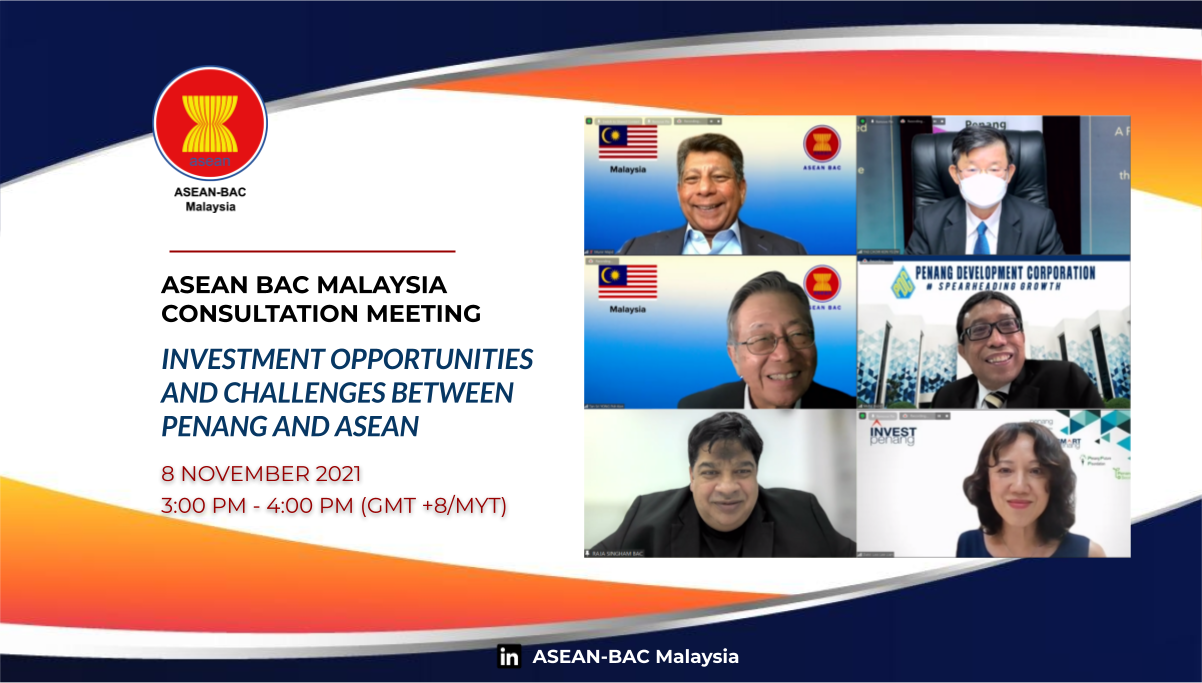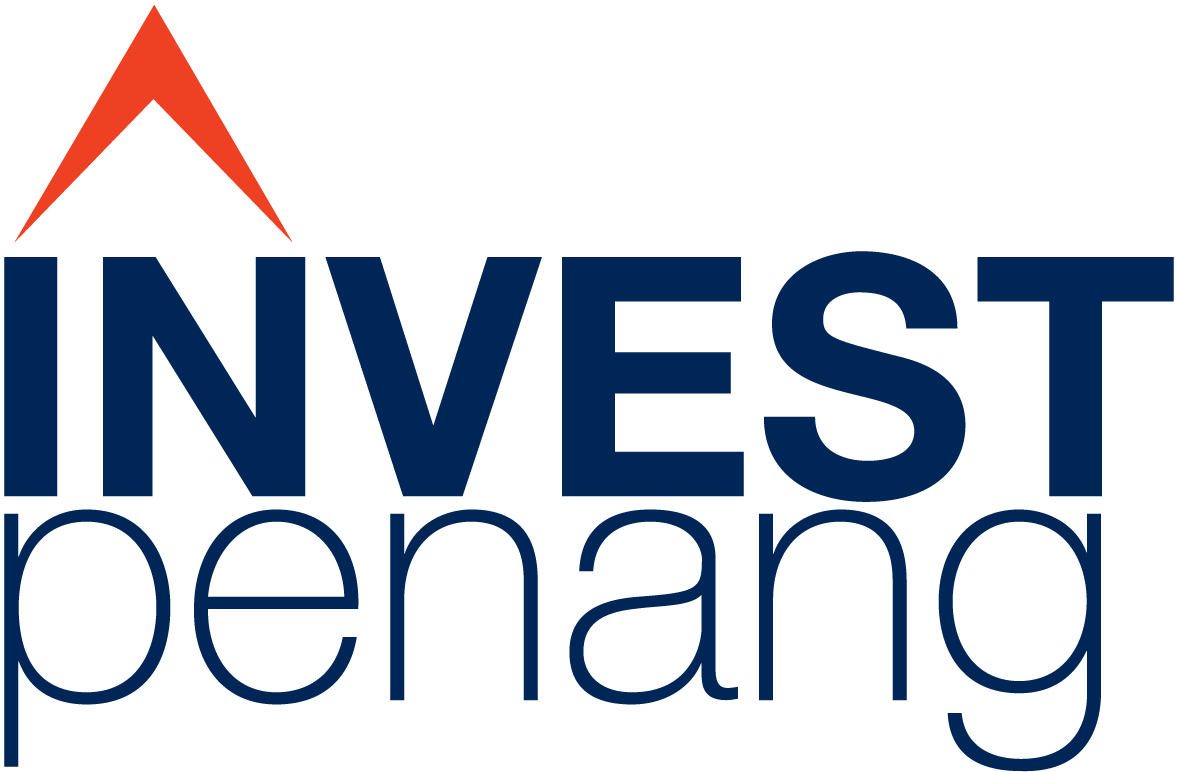
ASEAN BAC Malaysia Consultation Meeting: Penang Eyes ASEAN Partnerships to Become a Green and Smart State by 2030


Nov 8 – The ASEAN Business Advisory Council (ASEAN-BAC) Malaysia held a consultation meeting with the Penang state government and state agencies on 8 November 2021 to discuss the state’s efforts in attracting foreign direct investment, how it sees itself within the context of the larger ASEAN region, and its vision for the future of Penang.
“This year marks a challenging beginning to a new decade and for our journey towards Penang’s Vision 2030 for a family-focused green and smart state that inspires the nation,” said Penang Chief Minister Yang Amat Berhormat Tuan Chow Kon Yeow. “However, with our strong positioning in strategic industries such as electrical and electronics (E&E), medical technology, global business services, and the reopening of tourism, Penang is expected to contribute substantially to the nation’s recovery in the post-pandemic period.”
“Penang’s GDP recorded a -2.1% contraction in 2020, a less severe contraction when compared to the national average of -5.6,” he added. “We will bounce back stronger, solidify our position in the region as an investment, industrial and trade powerhouse, and enhance synergies with our immediate ASEAN neighbours who play crucial roles as Malaysia’s dialogue and development partners.”
The meeting was chaired by ASEAN-BAC Malaysia Chairman Tan Sri Dr Munir Majid, who noted that while Penang is projected to grow at an average rate of 5.4% from 2021 to 2025 under the 12th Malaysia Plan, the real challenge was in ensuring that such growth is achieved in line with Penang’s Vision 2030 for a green and smart state.
“Having been the leader in Malaysia’s manufacturing sector, can Penang now also lead the country not only to build back better but to build back greener in the aftermath of the COVID-19 pandemic?” he asked.
1. Penang’s manufacturing sector grew in 2020, bucking the pandemic downtrend buoyed by the strength of its E&E industry
Chief Minister Chow believes that Penang, Malaysia, and ASEAN in general will benefit from the growing trade tensions between the United States and China as multinational investors look to increase the geographic diversification of their investments. According to him, all economic sectors in Penang experienced a contraction in 2020 except for its manufacturing sector which grew by 2.8%, driven mainly by an increase in the production of E&E and optical goods.
ASEAN-BAC Malaysia Council Member Tan Sri Yong Poh Kon expects this uptrend to continue, “Penang has always been at the forefront in manufacturing especially in the E&E sector with a well-established ecosystem which includes the Penang Skills Development Centre (PSDC), Collaborative Research in Engineering, Science and Technology (CREST), and a supportive state government and state agencies. The state is expected to be one of the first to show quick growth in manufacturing with the opening up of the economy, extending later to the services and hospitality sectors which will need a greater level of support and attention to recover.”
Fellow ASEAN-BAC Malaysia Council Member Mr Raja Singham concurred, “Penang recorded RM1.1 billion in authorized manufacturing investments for 40 projects in the first quarter of 2021 alone and the state’s manufacturing sector will continue to be a leader in attracting strong foreign direct investments. The 12th Malaysia Plan will also assist in the state’s efforts to upgrade its economic and industrial structure and overcome the challenges brought by the pandemic.”
Mr Raja Singham also expressed hopes that Penang’s tourism sector will see a boom as COVID-19 pandemic restrictions ease.
2. Penang is well-positioned to be a gateway to the larger ASEAN market
ASEAN-BAC Chairman Tan Sri Munir Majid urged the state to tap into opportunities in the larger ASEAN, Regional Comprehensive Economic Partnership (RCEP), and Comprehensive and Progressive Agreement for Trans-Pacific Partnership (CPTPP) markets.
InvestPenang CEO Dato’ Loo Lee Lian concurred, “Leveraging on our expertise in the E&E and MedTech industries, technology frontiers could use Penang as a gateway to tap into opportunities in the ASEAN and Asia Pacific regions which have an increasing influence on the global technological landscape and rising purchasing power.”
“The state, via InvestPenang, continues to uphold Penang’s strong industry clusters and robust ecosystem that are critical for supply chain sustainability. Riding on the competitive edges of each country, ASEAN members could collectively create a strong regional ecosystem to serve the emerging sectors resulting from the advancement of technologies,” Dato’ Loo added.
Penang Development Corporation (PDC) CEO Dato’ Mohd Bazid Hj Abd Kahar, for his part, highlighted the state agency’s plans to develop Penang Health & Tech City, a new medical hub developed in collaboration with iHeal Health in Bandar Cassia Batu Kawan that will comprise private and public hospitals, as well as a plethora of lifestyle and wellness amenities. The hub will also house the ASEAN Institute of Transplantation, a new entity that aims to transform the region’s organ transplant ecosystem and emulate the success of organ sharing networks in the US and Europe.
“As ASEAN countries come together in areas of politics, economy and defence, healthcare can be another common bond to enhance the prosperity and wellbeing of the region. In this context, the setting up of an ASEAN Network for Organ Sharing (ASEANOS)—coordinated by the ASEAN Institute of Transplantation—will be a catalyst for the growth of organ transplantation in the region,” said Dato’ Mohd Bazid. “Since Malaysia is expected to helm the ASEAN Chairmanship in 2025, we envisage the opening of the ASEAN Institute of Transplantation to be the hallmark of events leading up to the 60th anniversary of ASEAN on 8th August 2027.”
3. Penang is committed to deepening cooperation with the larger ASEAN Community as part of the state’s Vision 2030
According to the state government, Singapore, Thailand, Vietnam and Indonesia are among Penang’s top trade partners, generating RM96.1 billion for the state in 2020.
“Penang also aims to enhance cooperation within the Indonesia-Malaysia-Thailand Growth Triangle (IMT-GT),” said Chief Minister Chow. “We have identified the areas for trade enhancement to include halal products, logistics, trading, components and parts manufacturing.”
“We are wholly committed to capitalizing on the enormous potential in both the IMT-GT and among our strategic ASEAN partners. Penang’s Vision 2030 is very much in line with the ASEAN 2025 ‘Forging Ahead Together’ vision and we will continue to be a strategic and enthusiastic partner in support of the ASEAN Community.”
Source: ASEAN BAC
